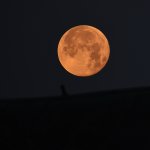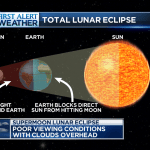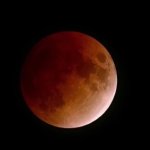When to See the Blue Moon in Los Angeles
May's full moon is set to rise over Los Angeles skies on Sunday night, in the midst of a total lunar eclipse.
Sunday's "Super Flower Blood Moon" gets its name from a dizzying combination of spectacular visual traits. Let's break down what each of them means:
See a Livestream of the Lunar Eclipse Below:
Why is May the Flower Moon?
May's full moon is known as the "Flower Moon," according to NASA, "for the flowers that are abundant this time of year."
In the 1930s, the Maine Farmer's Almanac began publishing Native American names for full moons at different points in the year. Other names for the May moon include the Corn Planting Moon and the Milk Moon, NASA says.

Super flower blood moon of May 2021 is seen in Srinagar, Kashmir.A "supermoon" occurs when a full moon is at its closest point to Earth in its elliptical orbit. The May full is known as the "flower moon" because it's typically at a time of year when spring flowers bloom.
What is a Supermoon?
This year's Flower Moon is also a supermoon.
A supermoon is defined as "a full moon occurring near or at the time when the Moon is at the closest point in its orbit around Earth," according to NASA. That closest point is called the "perigee."
Because supermoons are literally closer to us here on Earth, they can appear larger to the human eye, as a super-sized version of the regular full moon.
May 2021's full moon and an eclipse will culminate in a super blood flower moon. Here are details on what that means exactly and how to watch it happen.
Why is May's Moon a Blood Moon?
This month's moon gets the "Blood Moon" part of its name because there is also a lunar eclipse this month, visible from many locations in the U.S.
Lunar eclipses are caused by the orbits of the moon around the Earth and the Earth around the sun, according to NASA.
Sometimes, as all three celestial objects move around the solar system, the Earth passes between the moon and the sun. When this happens, the Earth casts a shadow, just like any other object that moves in front of a light source.

A diagram of a lunar eclipse from 2019.
The darkest, inner part of the shadow cast by the Earth, where the sun is directly behind us, is called the umbra. The more hazy and lighter part of the shadow around the edges is called the penumbra.
Lunar eclipses happen when the umbra falls on the surface of the moon.
The red color that gives us the name "blood moon" comes from sunlight filtering through Earth's atmosphere, illuminating the moon in a way that makes it appear red from the ground on Earth.
This happens even during total lunar eclipses, like the one taking place Sunday.
Where Can I See the Super Flower Blood Moon?
This eclipse should be easy to spot, happening earlier in the evening and wrapping up completely before midnight.
According to the Griffith Observatory's monthly Sky Report, the moon is set to rise at 7:41 p.m. PT.
Because the penumbra stage of the eclipse begins around 6:22 p.m., the moon will already have a hazy shadow when it rises, due to the stage of its orbit relative to the sun and the Earth.

NASA
The moon enters the darkest part of the Earth's shadow at 8:29 p.m., and will continue in that shadow until 9:54 p.m., when the moon moves out of the umbra.
Peak eclipse will occur around 9:11 p.m.
It will completely leave the hazy part of the shadow, the penumbra, at 10:55 p.m., according to NBC4 meteorologist Belen De Leon.
"Any location with a clear view of the moon can see this eclipse, and binoculars will show the changing appearance of the moon," according to the Griffith Observatory.
But if you'd rather get an up-close and personal view of the eclipse, the Griffith Observatory will be livestreaming the event here between 7:35 p.m. and 11:50 p.m.
Source: https://www.nbclosangeles.com/news/local/super-flower-blood-moon-lunar-eclipse/2890192/
0 Response to "When to See the Blue Moon in Los Angeles"
Post a Comment